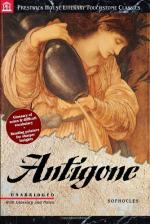|
This section contains 307 words (approx. 2 pages at 300 words per page) |
The Tragic Hero in "Antigone" by Sophocles
In Sophoclease's well-respected play Antigone, it is easy to see the ways that the main character, Antigone, fits the criteria for a tragic hero. First, like the tragic heros in in Otto Reinert's work, Antigone is virtuous in the eyes of others, yet she is guilty in the eyes of the law. Although the people strongly believe "she should have all the honor [they] can give her," Creon believes that Antigone is "guilty of a double insolence," and will not let her get away with breaking the law. She heard Creon's decree concerning her brother's burial, "and yet [she] dared defy the law," but citizens agree with her actions; if Creon follows through with his sentence for Antigone, the people of Thebes believe that it would be "so shameful a death for a generous act." Antigone also fits Reinert's description because she is vulnerable to law under penalty of death, yet she is great for overcoming the obstacle. Knowing she could die, she still would rather die for burying Polyneices than die a "death without honor," for she believes "that this crime is holy." Full of courage, she is "not afraid of the danger," and even though it means death she demands that "[she] will bring him." Also, like many tragic heros, Antigone arouses great pity because she stands alone in her actions. When she asks Ismene to accompany her in burying Polyneices, her sister replies that she "[has] no strength to break laws" and she "must yield to those in authority." Then, where Antigone criticizes Creon's laws that were made for the public good, "saying they were corrupt and of no sense, he replies, "You are alone in that opinion." These things relate Antigone to the theme of the tragic hero in this play of tragic events and great loss.
|
This section contains 307 words (approx. 2 pages at 300 words per page) |


